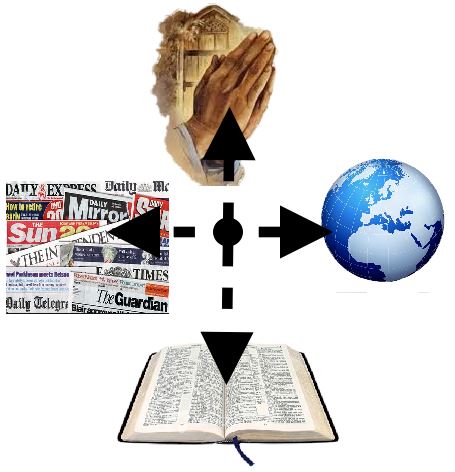Peter made the connection: we must do the same
When the Holy Spirit fell at Pentecost, the apostle Peter ‘joined up the dots’ between that event and its relationship to God’s prophetic word. The same perspicacity is vital in our day.
first published 08/09/13
And do this, understanding the present time. The hour has come for you to wake up from your slumber, because our salvation is nearer now than when we first believed (Rom 13:11).
Joining up the dots
 When Rowan Williams retired recently as Archbishop of Canterbury he offered a word of advice to his successor Justin Welby: When Rowan Williams retired recently as Archbishop of Canterbury he offered a word of advice to his successor Justin Welby:
“Preach with the Bible in one hand and a copy of the (daily) newspaper in the other.”
Alongside systematic preaching, it is vital to interpret the Word of God with relation to current events. However this task is not confined to preachers. It also behoves all of God’s people to marry up contemporary circumstances with God’s revealed purposes for our world. And of course to do so with any accuracy and integrity we need to know what His Word contains.
At the time when the Holy Spirit fell as tongues of flame upon the gathered believers, Peter the disciple, who was seldom short of words, had the presence of mind, an understanding of Biblical prophecy and a discernment of what was going on around him.
|
Peter declared: "This is that spoken by the prophet Joel!" |
In the midst of all the excitement and multitude of tongues he exclaimed: “This is that spoken by the prophet Joel!” (Acts 2:16).
His ‘situational awareness’ coupled with his knowledge of the Scriptures allowed him to ‘join up the dots’ and both accurately understand and clearly speak out on the import of what was happening on that amazing day.
Jesus told his disciples then, and his words remind us today, that his (second) coming will be “as the days of Noah. “For in the days before the flood, people were eating and drinking, marrying and giving in marriage, up to the day Noah entered the ark; and they knew nothing about what would happen until the flood came and took them all away. That is how it will be at the coming of the Son of Man” (Matt 24:37-39).
On the lookout
 While this warning is predominantly aimed at unbelievers, it illustrates a potential problem even within the Christian church. Will we be too busy with the everyday things of church and famly life to lift our eyes to the wider situation. Will we be unable to ‘see the wood for the trees’? Will rather we be like the Pharisees who were rebuked: “You know how to interpret the appearance of the sky, but you cannot interpret the signs of the times” (Matt 16:3). While this warning is predominantly aimed at unbelievers, it illustrates a potential problem even within the Christian church. Will we be too busy with the everyday things of church and famly life to lift our eyes to the wider situation. Will we be unable to ‘see the wood for the trees’? Will rather we be like the Pharisees who were rebuked: “You know how to interpret the appearance of the sky, but you cannot interpret the signs of the times” (Matt 16:3).
One of Jesus's most forceful commands was expressed in one word: "Watch!" The sons of Issachar "understood the times and knew what Israel should do". The prophet Habakkuk declared: "I will stand at my watch and station myself on the ramparts" (Hab. 2:1). And the Lord replied to him: "Write down the revelation and make it plain on tablets so that a herald may run with it. For the revelation awaits an appointed time; it speaks of the end and will not prove false. Though it linger, wait for it; it will certainly come and will not delay" (Hab 2:2-3).
We live in the most remarkable times when we see the Biblical prophesies reported in our daily newspapers. Jesus said: "Now learn this lesson from the fig-tree: As soon as its twigs get tender and its leaves come out, you know that summer is near. Even so, when you see all these things, you know that it is near, right at the door" (Matt 24:32-33).
A thorough grounding in God's word is absolutely essential, but if it is mere head knowledge it is not enough. A wide-awake discernment is also vital for our day: for any day.
Footnote: See also 'Sexuality, eschatology, Israel: falling leaves'
|